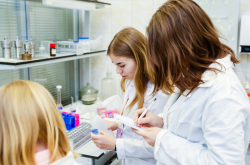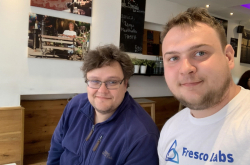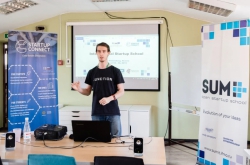AERIS

The project aims to help anyone who suffers from problems caused by low-quality ventilating systems. Most people who live in apartment blocks, especially multistoried ones, regularly face them. This happens because developers often cut down on ventilation systems, which results in their low quality. This leads to stagnation of carbon dioxide, which has a negative effect on the resident's well-being, mood, sleep, and nervous system. What's more, in absence of fresh air the humidity level increases, resulting in emergence of mold. To solve the problem, the team proposes to use a small-sized ventilation unit that can be mounted on the window sill or the window's upper frame. The unit also has filters for dust and fluffs. The device's power can be controlled remotely via a wi-fi router; soon, the developers plan to introduce heat recovery for the winter season and air ionization technology as well. The invention's main advantages are its small size and ease of installation. On the current stage, the team works on the unit's second prototype which will be used by the Okonka company - the team's business partner.
Remote presence robot (RPR)

It is no secret that the mobile platform market, as the robotics market in general, continues to grow. Members of the second team worked on ways to commercializing a remote presence robot. This robot is an automatic platform that moves on wheels in any direction; a top of the platform, there's a camera and a stabilization system. The device is intended for making the work of engineers, laboratory staff, assemblers and the like easier. For instance, such robot can help in utilizing nuclear waste, as it can operate in places where humans can't. Another application of such a system is in bomb disposal. The team members add that now, there are similar projects, but most of them lack manipulators or a camera.
A station for dehydrating viscous oil products

The station for dehydrating viscous oil products is a result of the Department of Industrial Ecology and Safety's 30 years’ work. According to data by the Russian Federation's Ministry of Energy, by January 2016 more than 23.5 million tons of mazut was produced. Mazut is an oil residual that can be used as low-quality fuel. Every surface that comes in contact with mazut has to be cleaned by water. This results in elaboration of oil sludges, which are often misused or even wasted. Recycling oil sludges has its problems as well: water decreases the fuel's efficiency, and the process contributes to pollution. As of now, there are three methods to recycle wastes from cleaning oil transports, but all of them are costly or take too much time.
The new invention is two unique devices that can produce up to 300 tons of quality furnace oil a day without discharging wastes into the atmosphere; among other advantages are low power consumption and the vast scope of application (they can be used not for mazut only, but any viscous oil products). As of now, a prototype has already been produced and showed 98% purification efficiency.
Seedling Mix

The project is on salad blends made of seedlings. As of now, there are many foods with low nutritional qualities but high in calories. The team proposes a type of nutrition that is high in energy but low in calories. ITMO's OLIMP laboratory created a setup that allows to grow seedlings under darkroom conditions. The setup is mobile and produces 50-80 kilos of seedlings in five days. According to the team's idea, the end product would be salad blends made of these seedlings. Such seedlings are low in calories, are easily digested and contain great amounts of vitamins and microelements, plus, having grown in darkness, they have a taste different from that of seedlings grown on one's window sill.
The team plans to open a retail network in the capitals and offer franchises to the regions.
Water+

This team's participants propose to solve the problem of the organism's recovery after physical exercise. ITMO's researchers have developed a tonic beverage that restores the electrolyte balance and contains easily digestible carbohydrates that provide for quick recovery. The beverage is made of natural ingredients: fruit juices and extracts and glucose-maltose syrup.
The product is intended not for professional sportsmen only, but everyone. The team now collaborates with the "Na Parah" cafe chain: the pilot batch will hit the shelves in the end of June. At the current stage, the team works on the product's design.
After testing the product at different joints, the team plans to sell it in supermarket chains and fitness clubs.
A plenty of benefit

This team's project is on a new technology for making bread with laminaria. Such bread will be rich in nutrients and especially iodine. According to statistics, 70% of Russia's population suffers from iodine deficiency, so the demand for such product is obvious.
The team members state that there is no such bread on the market; there are similar products, but one can only buy them on-line. If talking about St. Petersburg, its citizens can't buy them even on the internet. One of the advantages of the product is the precisely calculated amount of iodine, so that it is impossible to intoxicate oneself (which is a common problem when anyone enriches food with iodine by themselves). Also, it doesn't taste like laminaria - the developers decided on that after taking account of their target group's preferences.
At the current stage of the project, the team has developed a website where they tested the demand on their product. For production, they’ve made an agreement with a bakery for 50% of the profits. What's more, there's also an agreement with a particular coffee shop that is interested in adding the new kind of bread to their menu, and several whole foods shops are also interested in the novelty. As of now, the team is set on supplying their on-line customers and the coffee shop.
The team to win the pitch-session was that of the AERIS project; its members got the prize of 50,000 rubles and the opportunity to present their solution at an international business seminar in Ljubljana (Slovenia). Seedlings MIX was named the best project in the field of food industry, and the project on the station for dehydrating viscous oil products won the opportunity to become RexLexNova's resident.





